
PRONG – Eternal Heat
Anthony Morgan
April 2012
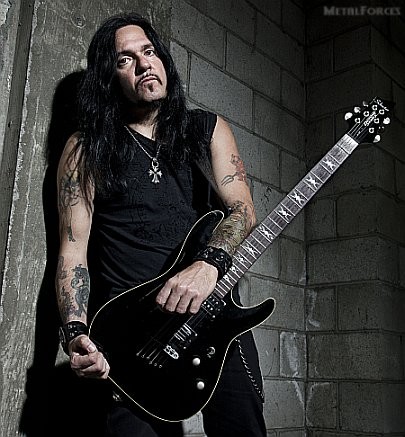
|
New York, United States-based heavy metal outfit Prong issued seventh studio full-length Power Of The Damager in October 2007 through 13th Planet Records, their last studio outing proper of the noughties. Five years would separate that album and its successor, mainman Tommy Victor remaining musically preoccupied between 2007 and 2012. Featuring his contributions were Ministry studio records 11 (The Last Sucker, September 2007) and 12 (Relapse, March 2012), Ministry And Co-Conspirators covers album Cover Up (April 2008), Prong remix effort Power Of The Damn Mixxxer (May 2009), and ninth Danzig studio offering Deth Red Sabaoth (June 2010, Evilive / The End Records).
“There were tours in there with those groups as well,” notes Tommy Victor, lead vocalist, guitarist, and co-founder of Prong. “Prong did some touring in the last two or three years too, even without a record coming out or anything. We did a couple of tours with the likes of Soulfly and Fear Factory, and did some scattered dates. I was in the mind of getting material together, and thinking about working on a record. That pretty much sums it up for the last five years, I guess.
“Not long ago though, I had to cut Ministry out. It was a simultaneous release; I worked on the Relapse record, and I told them I wasn’t going to tour with them for this because I’ve gotta focus on Prong. I’ve actually sacrificed a lot of stuff with Prong because of doing other things. It got to the point where I couldn’t do Prong that much, and it’s hard enough fitting in playing with Glenn. It’s always so crazy with scheduling problems that always come about, but fortunately Glenn doesn’t really do that many shows during the year so it seems to be working out okay. I’m dedicated to doing Prong as a priority now. That’s something I haven’t done in awhile because, again, there was so much other stuff I was busy with.”
Danzig is currently recording a covers album. “He’s pretty much doing it all himself, but I go in there every once in awhile and lay some tracks down with him,” the Prong singer reveals.
In recording Carved Into Stone, the assortment had a wide pool of compositions to select from. “The initial part of it was getting a lot of material together, and then trying to figure out which were the best ones later on,” Tommy recalls. “I just kept on writing, and that started about two-and-a-half years ago. We did stuff on ProTools, and I did some stuff on my own. Tony Campos and I jammed some stuff together on the road, and Alexei had some stuff. We came together, and just kept making demos in between tours etcetera. We then did a lot of those songs, demoed them again, went through probably four different stages of making demos, and got a producer. We picked Steve Evetts; he listened to all of the stuff, and between him and our managers we decided which songs we were gonna focus on. We got it down to like 14 songs out of 25. We did pre-production for the record, cleaned up some more stuff, and 14 songs went down to 11 songs. I was then in the studio for two months, and between mixing and mastering that was another milestone. The actual making of the record was like three months. It was a lot of work, more than I’ve done in a particularly long time.”
Of these leftover ideas, two might publicly surface in future. “There was one song we started doing the basic tracks for, but then we decided not to continue working on it because we wanted to focus on 11 tracks,” the mainman divulges. “So yeah, there are two really strong ideas probably that we may reconsider using. The rest of them are just in the garbage, and will probably never be used.”
Steve Evetts produced Carved Into Stone, having previously worked with Sepultura, Symphony X, The Dillinger Escape Plan, and Hatebreed, among others. According to Tommy, this is the first occasion that Prong has taken direction from a producer in the studio. “He was really pro-active in all aspects of it, including helping a little bit with arrangements,” he enthuses. “We wanted a guy that was gonna be really in tune with the vocals too. I’ve pretty much been producing myself vocally for all these years, and I didn’t really have anybody pushing me in a certain way. This record has a lot more focus on vocals, guitar playing, and all other aspects too like getting everything designed, and thinking out precisely things that we wanted to do.
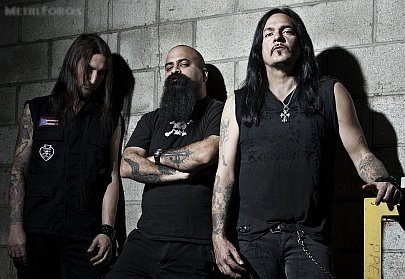
|
“As you get older, I guess you start getting stuck in certain ways and certain bad habits whether vocally or guitar playing wise. Steve was a bit of a disciplinarian in there, something that we needed in order to get a better record than we had put out previously. He’s worked a lot with Alexei on his drum parts, and the sounds too. We just tried out a whole bunch of stuff and agreed upon what amps to use, whereas in the past, working with Terry Date he’d be like ‘Is this your guitar rig? Okay, fine. Let’s just use that.’ We didn’t really try anything with Terry, and he didn’t really interfere… That’s a bad choice of words, but he didn’t have anything to do with the vocals really. He had me do what I did and that was it, but there was a very big difference on this one.”
Such comments suggest Prong is disappointed with Terry Date’s approach in hindsight, but the axeman is adamant that this isn’t the case. “No, not at all,” he stresses. “He got great sounds; for that time and what we were doing, that was really appropriate. I just wanted to re-challenge myself a little bit on Carved Into Stone, and I couldn’t do it on my own. I needed somebody that would be able to do that. From what people have been telling me and from listening to our records, Steve brought things up to date too. He was able to make Carved Into Stone sound current, and that’s what we did with Terry as well. Those records sounded very current, and this one does too. There was just a lot more participation from the producer. Terry was mainly an engineer, and totally focused on a lot of the sounds. I think what we got back then was something that is hard to achieve really, and the budget back then too… We were dealing with more money on Carved Into Stone; a pretty amount of money was spent on this record, which is completely the whole budget that we had. It’s pretty amazing what got accomplished with it.”
Steve Evetts pushed Prong’s individual members towards their very limits. “If he knew he could get something out of you, he kept pushing until you were able to do that,” Tommy remembers. “We didn’t cut any corners really; it was never ‘Let’s just go with that,’ but ‘We’ve gotta get it right.’ It took our standards to a different level; whereas normally I would’ve thought that it was okay, he would say that that’s not right. He just kept pushing it to the best that anybody could get. When I did the solos too, there were a lot of things here and there that… just little, tiny intricacies in terms of transitions in like a guitar solo or a rhythm part that you really take for granted. He was like ‘How are you holding that chord at the end of that part? It’s not right,’ or would say things like ‘You’re not really holding that chord down strong enough. You’ve gotta move to the next section in a different way.’
“These are just some things that I would never even think of. It was just a matter of tightness and trying to be perfect. As far as perfection goes you’re always gonna fall short a little bit, so you’ve gotta keep working to get those parts really dialled in and then double it all and at some points triple it. Vocals too… There were vocal harmonies, stuff that I never, ever did before. It was just finding the right notes to do it, and being able to do that. Maybe disciplinarian wasn’t the correct term, but we got in there early and worked all day. There was no partying and no fooling around; we just got it done.”
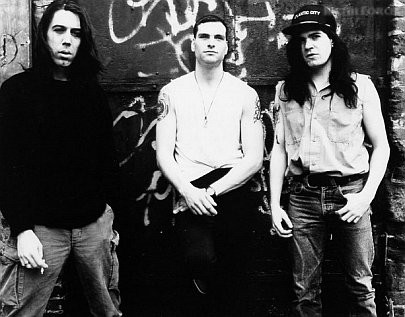
|
Steve’s advice for the frontman extended towards approaching vocals in general. “In the past, other guys in the group would go ‘You’re not pushing yourself hard enough. It doesn’t sound heavy enough,’” he muses. “Everyone would try to get me to scream more, and you lose the tonality of your voice in a lot of that. That’s why I was always curious, because I’ve watched other singers and it seemed like they weren’t struggling so much all the time. There’s a fine line between being wimpy or being overblown. He helped me find that right spot where the voice sounded good, but it wasn’t fake. It wasn’t like putting on another voice; it was me, but just me singing properly. For a producer that has been working with a lot of young guys on a lot of newer records, it was really a revelation to me in terms of how to approach singing or whatever you want to call vocals in this type of music. It was really helpful. I started being able to sing on my own without his instruction; I didn’t have to push it too hard, and I didn’t have to strain. There are certain ways of opening your mouth, a certain way to project without actually straining. Things of that nature. It was an education for me in a lot of ways.”
Albeit a positive experience overall, whether Steve Evetts will produce Prong’s next full-length is unclear. “The only problem I have with having a guy do a record twice is every time we did that, a jinx started happening,” Tommy cautions. “It seemed like Cleansing was really good, and then when we had Terry the second time it was like the familiarity between each other bred some contempt of some sort. It was the same thing with Mark Dodson with Beg To Differ; I thought we had communal agreement on a lot of things, and then the second time we went in we seemed to be arguing all the time. That’s really what I’m afraid of. It seems like every time we did something with a producer for a second time it wasn’t as fresh, and we weren’t trying to impress each other enough. The second time, it was always a different vibe.”
The entrance of bassist Tony Campos (Static-X) and drummer Alexei Rodriguez (ex-3 Inches Of Blood / ex-Walls Of Jericho) into the Prong fold was publicly announced on September 16th, 2009. “With the last record and touring cycle we had Aaron Rossi,” the guitarist explains. “He wasn’t able to tour with us, but we had a tour booked. We were ready to cancel the tour. We had a couple of other guys that wanted to do it that we were rehearsing with, but they weren’t working out. A friend of mine then said ‘What about Alexei?’ I didn’t know whether he would be able to do it, but I knew of him. He was basically there for the tour at first, and the same thing with Tony. We needed somebody we could go on tour with, so inevitably we started working together.
“They just play great, and are super professional. They just do a really great job. There’s nothing more you can say about it – absolutely fantastic. There’s no limitations with what you can do with somebody like Alexei playing drums. You never fear anything; if I write a really fast song, I’m not worried if somebody is gonna be able to cut it. With guys in the past, we really had to work around everyone’s limitations. If anything now we have to work around my limitations, because there are a lot of things that I definitely can’t do on guitar and vocals as well. I just do what I do.”
Occupying the guitar position in addition to supplying vocals immediately places limitations on a musician. “As far as playing the songs you’re doing two things at once and then soloing on top of it,” Tommy acknowledges. “It’s pretty obvious that there’s gonna be certain restrictions, unless you’re a complete magician. As far as technique, I’ve learnt as I’ve gone along. I wasn’t even really seriously playing that much when Prong started. The truth of the matter is I certainly fell into the whole thing. Before Primitive Origins (August 1987) I had never played a guitar solo in my life; that was just learnt on the spot, and I wasn’t even really playing guitar that much before that anyhow. I sang in a couple of cover bands as a bass player, and was really horrible, terrible. I never sang in a band before really. It wasn’t like when I was eight-years-old I said ‘I’m gonna be a rock star,’ was learning to play guitar, and had a teacher for years, a vocal instructor, or any of that stuff. That wasn’t the case at all. It’s not like kids today where their parents want them to be a rock star, and they’ve had lessons or what have you since they were little kids. That’s what I’ve gotta compete against in a couple of ways, people that have had a lot more instruction and support. I’m limited (laughs).”
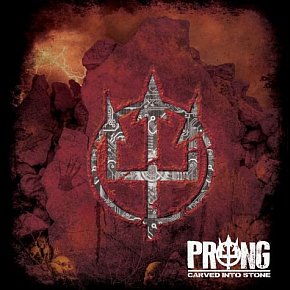
|
Nowadays, the vocalist is more confident behind the microphone stand. “It’s getting better,” he confesses. “Nowadays I think I am, yeah. Totally. It was definitely rough here and there in the past, but you can always improve on anything that you’re doing really. I didn’t really focus on it that much. I think with the help of having ProTools, you can work on your own a lot these days more. It has its downside too, where you can become too isolated. I don’t like sitting in front of a computer to make music. As far as tracking vocal parts and stuff like that or even guitar parts though, it’s a great tool once you get together with the band and jam stuff out. You can then go home on your own and figure it out. With the early Prong records there was nothing like that; I would just blast out some vocals while we were playing the song actually, and that’s what I would sing on the record. We didn’t have any tools to go home and look at what we were doing that much.”
Carved Into Stone’s lyrical content delves into a wide variety of topics. “‘Revenge… Best Served Cold’ is this story of a guy who knows that he’s hated, and has done some bad things to people in the past,” Tommy discloses. “He’s starting to get really paranoid, and his enemies feed on that. They just knock on his door and run away, and call him up on the phone and hang up. That’s what I mean by ‘Revenge… Best Served Cold’. ‘Eternal Heat’ is about getting that personal passion back and being able to get out there and actually write songs, which Prong hasn’t done in recent years. It’s about getting that energy, and tapping into the source.
“Then there’s the song ‘State Of Rebellion’, which is about the fact I don’t get involved in political discussions anymore with people. I’ve been there and it doesn’t really help anything. It’s almost in that realm where I numb myself and walk the fence a little bit, which isn’t a good thing. I started to numb myself from any kind of arguments or controversy. Of course when you’re young and you’re more brash, you’re quick to get into arguments a lot more. Later on you start to realise that it’s not really worth the trouble, and for your own sanity. There are other things that I’d rather spend my energy on, which is taking it easy really. It’s just a matter of priorities, but yeah. It’s not that I don’t have a strong opinions on things; it’s just that I don’t think it’s necessary to try to convert anybody, or even express myself that much. It doesn’t take precedent over other things in my life anymore.
“‘List Of Grievances’ is just a rant about hypocrites, and just people that wave this peace flag and say they’re all so liberal and left-wing. Meanwhile, you try to get paid by them and they’re ripping you off. They’re the biggest capitalists of anybody. Each song has its own identity.”
With the rise of the internet, viewpoints are a greater focus of attention and reach a wider spectrum of people. “Yeah, but it’s just a bunch of talk anyhow,” the singer dismisses. “It doesn’t really do anything. I think I’ve gotten to the point where I’m more into action than trying to converse. I have an old buddy of mine; we’ve been friends for a really long time, and we were hardcore punk rockers back in the day. He doesn’t drink anymore, because that wasn’t good for him. Every time we get together though we play video games like American football games or whatever on Xbox, but then he starts getting political. It’s like ‘While we’re hanging out, I don’t really wanna hear about it anymore.’ It’s the same old issues from when we were kids. I just smile at him. It’s great that he still has those views, but he’s just preaching to the converted and it’s pointless at this point in time. It’s like ‘Yeah, whatever. I don’t wanna hear about it anymore’.”
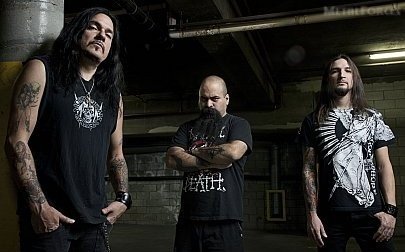
|
Tommy has an older brother, though their opinions generally conflict. “He’s at the other end of the spectrum – he’s very Republican,” he relates. “He starts ranting, and I don’t even respond to it. I don’t even say anything. I go ‘Yeah, yeah, yeah. That’s fine. Whatever,’ but years ago I would get into arguments with him. I’d be like ‘Shut the fuck up. You don’t know what you’re talking about,’ and it’s just pointless. I’d rather maintain the relationship than get into these battles with him.”
Comparing production as well as the sound quality of both Carved Into Stone and Power Of The Damager, Carved Into Stone is “just so much better,” the mainman concedes. “That’s so general a statement though. I think the songs were really good on Power Of The Damager mind, but there was no-one there to really help me take them to the next level. We didn’t examine the arrangements that much – it was just a free for all. Again, no-one was there to question anything and I think that’s important. I want somebody to critique what’s going on. When you’re involved in a project, it’s just a project. When I was working on vocals by myself for the demos for Carved Into Stone, I would send Tony Campos a file or Alexei and say ‘What do you think of this?’ Tony would go ‘I don’t know man. You should try something else,’ and I was like ‘Cool, man. Great.’ I want everyone to be happy about it, even the managers too. One of our managers used to be an A&R guy, and I was sending him a lot of stuff. That gives me more confidence, and I feel secure about what I’m doing. I’m not that much of an egotist to go in there, and go ‘Everything I do is great.’
“I think on Power Of The Damager, I had to do that. It was pretty much all me. Monte (Pittman, bass) was there for three days and then he left, so he wasn’t even there during the process. His contribution was limited therefore, and it was the same thing with Aaron. He came to jam on the stuff, and then split. It was a very lonely experience. With this one I wanted everyone to be involved more, and keep an eye on me to make sure that I was going in the right direction. Even during the process of the album, I didn’t know where we were going, so I was frustrated. I had to really trust Steve Evetts on a lot of things. I was hitting these dark holes where I was like ‘I don’t really know how this fucking thing is coming out,’ and I was freaking out. We really didn’t listen to anything afterwards; we would just lay it down, and onto the next.
“We didn’t have enough time to make any judgements. We had to commit ourselves to certain things, like even effects and certain vocal parts we went with. We didn’t do anything in the mix really; it was all there while we were recording. There was a small amount of processing going on on the record, as you can hear. We didn’t go back and listen to things, because we weren’t able to do that. All these things didn’t exist with Power Of The Damager; it was like ‘We’ll put something in later,’ or ‘We’ll fix that up and find another part.’ We didn’t do any cutting and pasting on this record. It’s all played; with each verse we didn’t copy and paste parts from another segment, and all the choruses were done completely from start to finish. It’s not a computer record.”
On November 11th, 2011, it was publicly revealed that Prong had inked a global contract with Long Branch Records / SPV Records. “We actually had to go in and make demos, and send them out to labels again,” Tommy admits. “That actually helped the end all result of the record because I think it pushed us to do better songs, and I wanted the best songs possible to impress a label and impress people. We got rejected by a lot of people, and a lot of people were interested. SPV were more interested than anybody, really. You can tell in this process when people are answering your phone calls, and getting back to you fast. We didn’t wanna pull any teeth, or beg. When somebody was really interested in doing it, was excited about it, and had faith in an older band like Prong, that was something that was important to us too. It’s a youth-oriented thing; a lot of labels want to break something new and fresh, which is fine. It’s difficult to find anybody that’s interested in something that’s based in the past a lot. They definitely don’t want to put out a new record from a legacy band.”
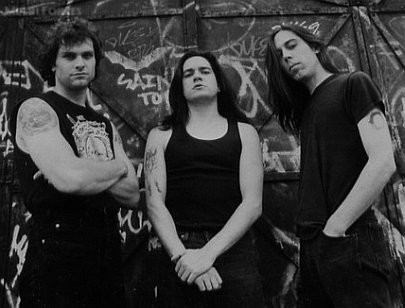
|
Nothing is wrong with a legacy band, in this writer’s opinion. “I know, but there’s a lot of snobbery out there too,” the axeman observes. “A lot of people roll their eyes about something that’s been around the block a bunch of times. There’s different segments of the rock world that have different views on things.”
Carved Into Stone’s artwork was designed by Vance Kelly, who has previously undertaken commissions from Down and The Sword. “Mike (Gitter) – one of our managers – was an A&R guy, so he had a lot of resources,” Tommy surmises. “I don’t know who the hell’s doing artwork out there. I’m not that in touch with it, based on the fact that I’ve been on the road a lot in the last five years and concentrating on other things. I’m not really seeing what’s going on, so he just sent over a whole bunch of guys to me. I looked over what they did. He said ‘This guy’s really good; he works fast, and he’s really open to ideas.’ I pretty much told him what I wanted, and he did it. We collectively thought that out as well. It was sort of a no brainer what the cover was supposed to look like, but just needed the right guy to do it.”
From hereon in, Prong will likely be a more active outfit. “As long as we can make it happen, yeah,” the frontman confirms. “It’s something that I’ve been thinking about a lot. I think it’s really necessary for us, and I’ve been hearing this too from kids, fans or whatever. They really don’t wanna wait four years between records, and we don’t wanna keep having to try to build up the momentum again. I don’t wanna go through that anymore, either. As soon as I get any opportunity between tours or whatever – any solitary moments – I’m gonna start working on songs again in order to have ideas for the next record. That’s another hurdle. I’ve just gotta pull myself together to do that, wake up and pick up the guitar rather than do other things. So yeah, definitely. That needs to happen. That’s a very important thing, and that’s a great question too. That’s really one of the main things on my mind these days.”
Carved Into Stone was released on April 20th, 2012 in Europe and on the 24th in North America, all through Long Branch Records.
Interview published in April 2012.





